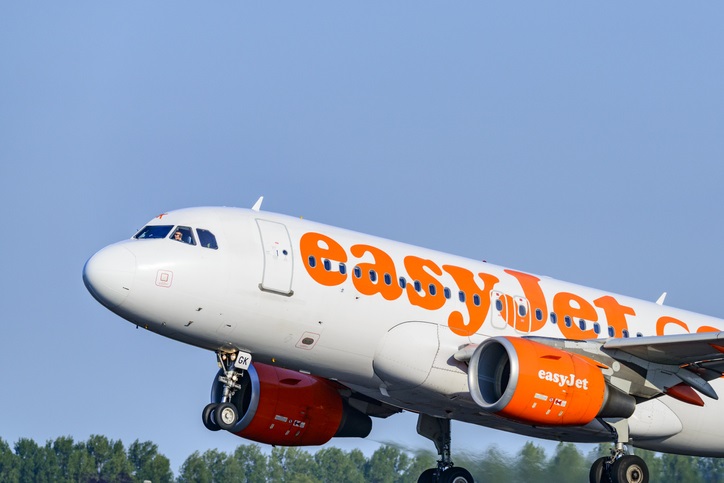ii view: easyJet raises recovery hopes despite poorly staff
12th April 2022 11:06
by Keith Bowman from interactive investor
Passenger numbers are up and group net debt is down. We assess prospects.

First-half trading update to 31 March
- Operated at 67% of full year 2019 capacity during the second quarter
- Operated at 80% of full-year 2019 capacity in March
Guidance:
- Expects a first half loss before tax of between £535 million and £565 million
- Expects third quarter capacity to be 90% of third quarter 2019 levels
Chief executive Johan Lundgren said:
"easyJet's performance in the second quarter has been driven by improved trading following the UK Government's decision to relax testing restrictions with an extra boost from self-help measures which saw us outperform market expectations.”
ii round-up:
Low-cost airline easyJet (LSE:EZJ) today reported significantly improved trading following the lifting of UK Covid-19 travel restrictions in January, with summer demand at near 2019 pre-pandemic levels.
Passenger numbers hit 11.5 million in the second quarter to the end of March compared to 1.2 million in the same pandemic hit period a year ago. Summer, or fourth-quarter bookings are running at near 2019 summer levels, with management’s expected first-half loss of up to £565 million better than City forecasts for nearer to £580 million.
easyJet shares rose marginally in UK trading having fallen by around 2% year-to-date. Markets more broadly were in the red as investors continued to contemplate both the war in Ukraine and expected rises in global interest rates to quell runaway inflation.
easyJet said it had very little exposure to Eastern Europe, with no routes into Ukraine, Russia or Belarus. Shares for low-cost rival Wizz Air (LSE:WIZZ) have fallen by almost a third year-to-date, with the airline suspending flights to Ukraine, Russia and Moldova. Shares for British Airways owner International Consolidated Airlines Group SA (LSE:IAG) are down by close to 4% in 2022.
- The investment lessons from the 1970s as inflation soars and rates rise
- Tips for recession-proofing a portfolio: where to start?
- Best stocks to own during the last tax year
easyJet also flagged that it had hedged 64% of its second-half fuel requirements at $571 per metric tonne, reducing its exposure to current fuel prices. Oil, a key cost for airlines, is up close to a third year-to-date as Europe in particular seeks an alternative supplier to Russia.
Despite a recent spike in crew members testing Covid positive, easyJet still managed to fly 94% of its planned schedule in the last seven days with daily flight volumes around 1,500 per day. That’s four times higher than the same point last year.
First-half results to the end of March are scheduled for 19 May.
ii view:
Launched in 1995 and floated on the London stock exchange in 2000, easyJet is a short-haul European airline operating a fleet of Airbus aircraft. Its strategy initiatives include a focus on its network strategy, or moving aircraft to airports of higher demand. It is also growing its easyJet holidays business in partnership with major hotel brands such as InterContinental Hotels (LSE:IHG) and Accor (EURONEXT:AC), and retaining a strong focus on costs.
For investors, outlook uncertainty and the number of factors outside of management’s control remain high. Consumers are now pressured by rising prices, with UK interest rates also expected to rise further. A war in Ukraine and the broader economic recovery from the pandemic have resulted in higher fuel prices, while concerns about the pandemic cannot be completely dismissed given the recent hike in staff infections and sickness.
On the upside, consumers now appear to be keen to travel given pent-up demand as a result of prior travel restrictions. Some addressing of elevated fuel prices has been made via hedging, while net debt has fallen to £0.6 billion as of late March compared to £0.9 billion in late September. In all, while some caution remains sensible, room for longer-term optimism looks to persist.
Positives:
- Cash and cash equivalents of £3.5 billion held
- Growing its holidays business
Negatives:
- Uncertain economic outlook
- Factors outside of management’s control like the weather can hinder performance
The average rating of stock market analysts:
Buy
These articles are provided for information purposes only. Occasionally, an opinion about whether to buy or sell a specific investment may be provided by third parties. The content is not intended to be a personal recommendation to buy or sell any financial instrument or product, or to adopt any investment strategy as it is not provided based on an assessment of your investing knowledge and experience, your financial situation or your investment objectives. The value of your investments, and the income derived from them, may go down as well as up. You may not get back all the money that you invest. The investments referred to in this article may not be suitable for all investors, and if in doubt, an investor should seek advice from a qualified investment adviser.
Full performance can be found on the company or index summary page on the interactive investor website. Simply click on the company's or index name highlighted in the article.